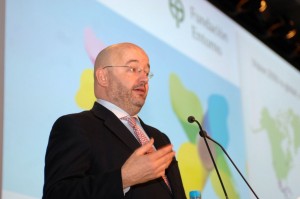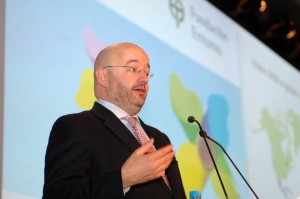Telefónica Public Policy & Telefónica España Regulatory teams
On Wednesday 21st November, the Entorno-BCSD España Foundation and the World Business Council for Sustainable Development (WBCSD) presented at Telefónica’s headquarters in Madrid a document entitled “Changing Pace”, a report that lists the type of policy initiatives that can be carried out through cooperation of the business sector and public administrations in order to speed up progress towards sustainable economic growth.
The meeting was presided over in its opening ceremony and subsequent panel discussion by Peter Bakker, WBCSD President, Cristina García Orcoyen, Managing Director of the Entorno Foundation and Alberto Andreu, Global Director of Public Affairs at Telefónica. The event and the document featured the support of Telefónica, Lafarge, Pepsico, Solvay and Unilever.
With Changing Pace, the WBCSD intends to examine what are the best public policies that can help achieve, without any delay, the goals of Vision 2050: that “9,000 million people enjoy an acceptable standard of living commensurate with the planet’s limits”. For this purpose, the document lists a series of proposals involving nine core areas:
- values of people,
- human development,
- economy,
- agriculture,
- forests,
- energy and electricity,
- buildings,
- mobility,
- materials
Despite the structure’s proposal, the WBCSD has made it clear that Changing Pace is not a recipe, nor does it offer a definitive consensus on what the answers might be. Instead it is an invitation to governments, civil society and other leaders of the business world to actively participate in the dialogue that will shape policy solutions and open the paths to be followed towards 2050.
The presentation of the document and debate was launched by Alberto Andreu, who stressed the idea that “speaking about sustainability today is talking about a different economic model, one capable of generating wealth and employment”. Peter Bakker also highlighted the need for a new economic model and, in order to achieve this, we need a “revolution of capitalism”. Cristina García-Orcoyen pointed out the relevance of this debate for helping companies to find the path toward sustainability. Elisa Barahona, Director General for Sustainability for the Madrid City Council, applauded this initiative on behalf of the public administrations.
Now it is up to civil society, the private sector and the public administrations to work in a coordinated manner and without any further delay so that the latter may implement all these measures that will lead us to achieving the goal of Vision 2050.















